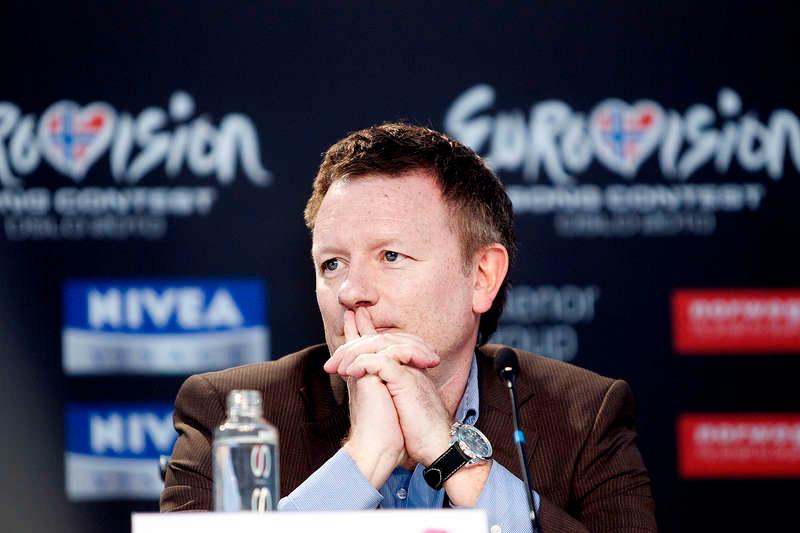EBU boss tried to ruin Swedens contestant in smear campaign
Uppdaterad 2015-05-28 | Publicerad 2015-05-22
Aftonbladet can confirm allegations of foul play
VIENNA. Aftonbladet has seen the evidence.
The message against Måns Zelmerlöw did indeed come from the Facebook account of a Eurovision official - a journalist was urged to try to ruin Måns’ chances of winning the Eurovision Song Contest.
CLICK HERE FOR SWEDISH VERSION
Following a report first published on Typologies.gr, the media blog of Greek newspaper Paron, Aftonbladet can confirm that Jarmo Siim, a Eurovision communication coordinator and editor-in-chief of the official Eurovision.tv website, contacted a Greek journalist via Facebook direct messaging early April in an attempt to discredit the song Heroes, Sweden's entry in this year's Contest.
”Between us, keep on bashing the Swedish song and put pressure on us,” he wrote.
Around the same time in April several Eurovision blogs and news sites were reporting on similarities between Heroes and David Guetta's hit Lovers On The Sun, as well as visual similarities between Sweden's stage performance and a YouTube video posted by a French performance artist.
It was also at that time that Zelmerlöw's performance of Heroes at the Swedish Eurovision preselection contest Melodifestivalen was also removed from Eurovision.tv - the site for which Siim is editor-in-chief - for reasons of possible copyright infringement.
Denies any knowledge
Aftonbladet has met the journalist who received the message, and has been given access to his Facebook profile, where it was able to trace the message back to Siim's official Facebook account. This is the same profile he's been using during this year's Eurovision Song Contest to update friends, acquaintances and others about what is happening in Vienna.
With the assistance of Aftonbladet's IT experts, we have been able to verify that the Facebook profile from where the message was sent is identical to the one Jarmo Siim has been using for several years.
When Aftonbladet questioned Siim about the details reported on the Greek blog on Monday, he replied: ”I do not recognise this quote, I don't recognise it.”
But despite having several opportunities to deny having sent the message, he didn't do so.
Siim's boss, Eurovision Song Contest event supervisor, Sietse Bakker, stated that it was all made up: ”Of course Jarmo didn't write that message,” he wrote in en email. He also questioned the credibility of Typologies.gr.
On Tuesday, Eurovision's executive supervisor Jon Ola Sand was asked during a press conference if he - and the European Broadcasting Union - believed that the Facebook message was fake, he replied simply, ”Yes”.
Following the press conference, Sand told Aftonbladet that the EBU had been given access to Siim's Facebook account, and couldn't find any trace of the month old message in question.
But Aftonbladet has been able to verify that the message was sent from Siim's Facebook profile to the Greek journalist.
Swedish delegation: ”We will of course react”
Aftonbladet contacted Sweden's delegation head Christer Björkman just before Thursday's second semifinal for comment following its investigation.
”If what you say is correct, and if the EBU changes its stance, we will of course react to that. I just want to focus on what we are here to do, which is to compete.” he said.
Last night, Aftonbladet tried to contact Jon Ola Sand several times, and requested to meet him for an interview or to talk on the phone. He sent a text message to say that he was too busy with the second semifinal, and asked to receive our questions via email. Aftonbladet responded via text message with the subject and details of this story, and Sand replied that he would get back to us with a comment after the broadcast.
However, Aftonbladet was instead contacted early this morning via email by event supervisor Sietse Bakker, where he requested to see more evidence.
Eurovision Song Contest executives

Jon Ola Sand
Official title: Executive supervisor of the Eurovision Song Contest
Employed by the European Broadcasting Union (EBU) as the boss of the Eurovision Song Contest. Seen on screen during the Contest as the man who verifies that the voting results are valid.

Jarmo Siim
Official title: Communications coordinator and editor-in-chief of Eurovision’s official website, eurovision.tv
Deals with press enquiries and communications for Eurovision on behalf of the EBU. Employed by PR agency Wow Works, which is contracted by the EBU to deal with these matters. Wow Works’ CEO is Sietse Bakker.

Sietse Bakker
Official title: Event supervisor of the Eurovision Song Contest
Since 2011, the event supervisor deals with everything not related to the actual broadcast. Bakker is also CEO of PR agency Wow Works, which is contracted by the EBU to provide various services in relation to the Eurovision Song Contest. Wow Works employs Jarmo Siim to deal with press relations and communications for the Eurovision Song Contest on behalf of the EBU.

How Aftonbladet verified the Facebook message
The EBU has stated that the Facebook message is fake. However, this is how Aftonbladet reporter Torbjörn Ek verified the opposite:
1. Checked that the message was sent via www.facebook.com
Aftonbladet met with the source in Vienna and he showed us the message using the Facebook app on his phone.
Aftonbladet requested to see the message on a computer, and was seated next to the source as he logged on to www.facebook.com using his laptop.
To verify that the source wasn’t using a copy or a fake version of Facebook, Aftonbladet made the source browse to several different Facebook profiles, while our reporter did the same on his own laptop.
Aftonbladet also made the source browse to the Facebook profile of our reporter so we could verify that his profile was updated on the source’s laptop when our reporter updated his profile from his own laptop.
2. Saw the actual message and verified who sent it
Aftonbladet was shown the actual Facebook direct message, and saw that it was sent from a profile using the name Jarmo Siim. The URL for the sent message was https://www.facebook.com/messages/jarmosiim
Clicking on the sender’s profile, Aftonbladet verified that it was identical to the official profile of Jarmo Siim: https://www.facebook.com/jarmosiim
To be completely sure that it really was the Facebook profile of Jarmo Siim, Aftonbladet made our source change the ‘www’ of the URL to ‘graph’ - which is how you can see the user ID of the actual profile.
This information was then double-checked by our reporter by entering Jarmo Siim’s official Facebook profile using his own laptop and extracting the user ID in the same way as described above, switching ‘www’ in the URL to ‘graph’.
The user ID, 598182632, proved to be identical to the ID of the sender of the Facebook direct message that was received by the source.
3. Verified that the Facebook account really is used by the alleged sender
The account under the name Jarmo Siim shares 32 mutual Facebook friends with Aftonbladet’s reporter. They are all connected to the Eurovision Song Contest through work or special interest. The Facebook account under the name Jarmo Siim with the ID 598182632 has been active for several years, and has been updated regularly with public posts about the Eurovision Song Contest.
4. Verified that no one else had sent the message using Jarmo Siim’s Facebook profile
Theoretically, another person could have sent the direct message without Jarmo Siim’s knowledge. To protect our source, Aftonbladet cannot expand on this more than to clarify that the message received was part of a lengthy Facebook conversation between Jarmo Siim’s profile and that of the source.
Why is Aftonbladet not naming its source?
The media’s obligation to protect its sources is part of the Swedish constitution with regards to the Swedish freedom of the press act.
This legislation gives the right of anonymity to anyone who gives information with the intent that it be published. This imposes a strict requirement of confidentiality on journalists, guaranteeing that the identity of the source will not be disclosed in any way possible.
Breaking this law could lead to up to a year in prison for any journalist who contravenes it.
In Aftonbladet’s dealings with the source for this report, we have agreed to refer to him in the same way as has already been made public in the article published on Typologies.gr - as “the source’, “he/him”, and “the Greek journalist”.


